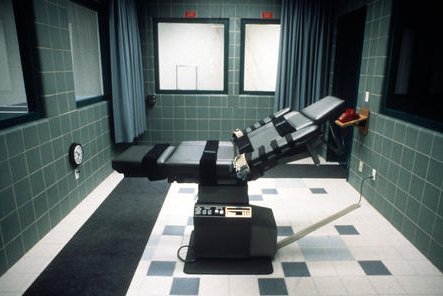Oklahoma officials have asked the court for more time to get their lethal injection plans in working order. rlw/HO UPI |
License Photo
OKLAHOMA CITY, Oct. 13 (UPI) -- Three executions scheduled for the month of November in Oklahoma have been delayed after the state filed a motion for a 60-day stay.
The news comes only weeks after Oklahoma officials gave members of the press a tour of their new execution facilities and declared the executions would resume as planned in early November.
But a motion filed Friday by Oklahoma Attorney General Scott Pruitt requested that the state's appeals court reschedule three executions for January, allowing officials with the correction system's lethal injection program additional time to train staff and procure reliable lethal injection drugs.
In April, Oklahoma inmate Clayton Lockett reportedly writhed in pain for 43 minutes before succumbing to a heart attack as a result of his botched execution -- attempted via a poorly attached IV, which delivered an untested cocktail of supposedly lethal drugs. Embarrassed, Oklahoma hit the pause button on their lethal injection program. The Oklahoma Department of Public Safety subsequently issued a report -- as requested by the state's governor -- calling for the Department of Corrections to update and improve execution protocols and to retrain of staff. Officials also set about to finding new, more reliable drugs.
Prisons in the 32 states where capital punishment is still legal have had trouble finding enough of the drugs used to execute death row inmates. A European-led boycott of by many pharmaceutical companies has complicated the the sale of lethal drugs to American prison services. Prison officials also say it's increasingly hard to find medical professionals willing to assist in state executions.
By postponing the upcoming execution to the beginning of next year, corrections officials will have additional time to address these issues, the state's Assistant Attorney General John Hadden wrote in Friday's motion.
"The training will involve multiple training scenarios for all execution team members and will include contingency plans for execution equipment and supplies, offender IV access, inmate consciousness, unanticipated medical or other issues concerning the offender or execution team, and security issues at the penitentiary during an execution," Hadden wrote, according to reporting by The Oklahoman.
"While we continue to work diligently to meet the mandates of the training required in the protocol, we feel we should not rush the training," state Corrections Department Director Robert Patton agreed in a statement released Monday. "We appreciate the Attorney General's efforts on our behalf and we await the decision from the court."















